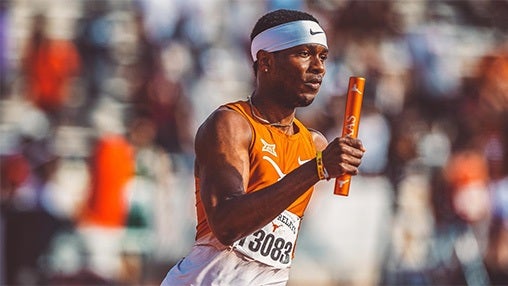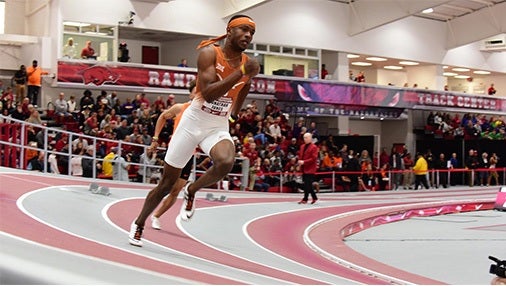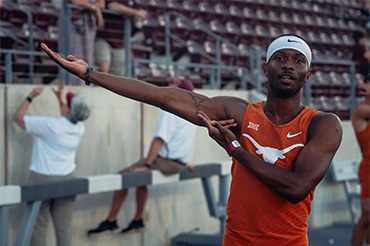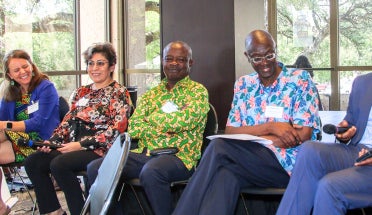
Jonathan Jones Breaks Records — and Barriers — On and Off the Track
- Mar 21, 2023
- by Alex Briseño
[Editor’s Note: This is the second installment of Texas Global’s international student-athlete series, which celebrates Longhorn competitors from around the world and shares the stories of their journeys to the Forty Acres.]
Jonathan Jones, a graduate student and sprinter from Barbados, has spent his five years on campus etching his name into the track record books at The University of Texas at Austin.
As he learned, racking up an astounding seven school records takes time. That’s why Jones still laughs about the younger version of himself who arrived at the Forty Acres in 2018.
“On my first day, I asked, ‘OK, what is the school record for the 400 meters?’ ” Jones said.
(Answer: 45.25 seconds)
“Then I said, ‘OK, I want that record. I’m taking it!’ I was crazy my first year. If you were lining up against me, I needed to win, and I wanted to break records.”

The sprinter spent his next five years doing just that. Just as he broke records, though, he also built relationships on and off the track. He even connected with a Barbadian community whose members all helped in turning Austin into a second home for him.
This expansive community is one of the many factors that played a vital role in Jones’ success, even helping him find sustainable methods of freeing himself from his pesky impostor’s syndrome.
Now, in his final act at UT Austin, the Barbadian runner is working to embrace the ebbs and flows that inevitably permeate the life of an international student athlete, especially one who nurtures ambitions of winning national championships and rewriting record books.
Life-Changing Ultimatum
Jones was always running as a kid growing up in Saint Lucy, the northernmost parish on the island of Barbados, where his family continues to reside. As he remembers it, everything was a race.
“If I had something to do with my friends, it was always a race to see who would do it first,” Jones said. “It didn't matter if it was on bikes or on foot, we were going to race.”
When his grandmother asked him to fetch the newspaper the equivalent of two blocks away, Jones sprinted the entire way, snagged a copy of the daily paper and sprinted back. Don’t ask him why; there was no rhyme or reason.
“I just did,” he said.
It wasn’t until he was 14 years old that Jones started officially training for track, which is late for most kids competing for a Division I scholarship. And running track wasn’t even Jones’ first choice.

“It definitely was not by choice. It was by force, thanks to my physical education coach,” Jones said. “I was a volleyball player. I guess he saw a glimpse of something in me when I would run down loose balls.”
Jones’ coach gave him an ultimatum: You can run track or cross country, or you’re going to run up and down the court after volleyball practice.
“I made my decision to join track — a wise one because I was not about to do all that,” Jones said.
“So Said, So Done”
Watching the 2012 Summer Olympics in London, Jones was in awe of Kirani James, a Grenadian sprinter who earned the gold medal in the 400 meters.
“That inspired me. I thought, ‘I wish I could run at the Olympics. I wish I could be like him,” Jones said of James, an athlete he looks up to and has since competed against.
But Jones admits, “That wasn’t concrete. It was just a wish.”
He points to two specific races when asked about the moment he began to realize his potential. The first opportunity Jones had to represent his country arrived at the 2015 CARIFTA Games, an annual competition among Caribbean countries.
He placed second in the 800 meters and third in the 1500 meters. A part of Jones was proud of the medals he had just won for his country. In the same breath, though, he said, “I didn’t compete for second or third.”

“I told myself, ‘Next time I go to the CARIFTA Games, I am not only going to get a gold medal, but I’m going to break the record,” Jones said.
And, as he likes to say, “So said, so done.”
Jones’ 1:49.88 mark, which he set the ensuing year, still stands as the CARIFTA Games record for the 800 meters.
“That’s when I said, ‘That’s the success I am looking for on the track. That’s what I want to do. I want to keep competing a high level, and keep going higher and higher,’ ” he said.
Jones continued that success, totaling four gold medals, four silver and a bronze between 2015 and 2018. As scholarships to major Division I programs started to come in, Jones said, “I just kept going with it because I saw some success and also saw what it could do for me.”
That pursuit resulted in a campus visit to UT Austin, which Jones quickly viewed as a perfect fit.
Building Community
Head coach Edrick Floréal saw Jones’ talent and record-breaking potential immediately.
“I saw it as a freshman — he had an unbelievable year,” Floréal said. “He was vocal and passionate about those records, big-time, and it developed even more throughout his time at Texas.”
As is the case with most freshmen new to campus, though, Floréal also saw a kid “trying to figure life out.”
Any uncertainty on Jones’ end would be more than understandable. After all, this was a new beginning in a different country for a first-generation college student. Coming to UT Austin also meant saying goodbye to Saint Lucy.
“Oh, that was hard, I won’t even lie about it,” Jones said. “My grandparents raised me my entire life, so that was the first time I moved away from home and had to fend for myself.”

He added, “Having to deal with being a first-generation college student: That’s what made it hard.”
As he reflects on those growing pains now, Jones proudly expresses his gratitude for the people he finds himself surrounded by, who have helped turn what was once a strange, new city into his home away from home.
“I have definitely built a family here — not even with just my teammates or coaches,” Jones said. “I’ve met Barbadians who live in Austin and have basically become my second family now. We got so close, I decided to move close to them. Just in case anything happens, I have my family nearby, five minutes up the street.”
Redefining Success
That record in the 400 meters that Jones asked about on day one? After holding its place for 27 years, that was broken when he clocked a 45.02 as a freshman.
Floréal was well aware of Jones’ passion for breaking records early on. He even told Jones he would be the first-ever Longhorn to run the 400 meters in under 45 seconds, a prediction that became a reality before Jones even completed his first season.
“I believed every word Coach Flo said,” Jones said. “Then he said I’d run it in 44 (seconds) — so said, so done. My belief in myself and what my coach says was crazy my first year.”
This sequence was an early indicator of what was to come for Jones: A 2022 national championship, four Big 12 championships, nine-time All-American honors, seven school records and, yes, an opportunity to compete at the 2020 Summer Olympics in Tokyo.
But, just as Floréal noticed Jones’ immense talent as a freshman, he also saw the potentially difficult expectations that come along with early success.
“Unfortunately, expectations in sports can pull you down. One moment you’re a regular kid doing well and fine, but you can’t really have an off day,” Floréal said. “You have one bad meet, and everybody on the internet is saying your career is over. I think the judgmental side of the internet really contributes to a lot of these kids’ mental health challenges.”
To respond to these challenges, Floréal tweaked his coaching philosophy and now finds himself striking a fragile balance. He still figures out who, and what, he needs to be for each individual teammate, just as he’s always done. A new caveat, though, is trying to teach his team to realize that they also have the skill set to get themselves out of jams, too.
“Sometimes I do nothing, and I just cautiously let them figure it out,” Floréal said.
He added, “Other times, I do jump in if it feels like a tough situation to deal with. If a kid loses a loved one, that’s non-negotiable. But if it’s just a bad race, sometimes I act like I don’t even see it.”
What Floréal found is that the students eventually come around to figuring it out.
For Jones, part of “figuring it out” included therapy and yoga, two tools that assist with settling his mind and body on race days, and every day. The importance of understanding situations and adjusting expectations accordingly cannot be understated, either, he says.
“I don’t like setting time goals anymore because that feels limiting and also applies unnecessary pressure,” he said. “My freshman year, I wanted to win every single race. As I’ve gotten older, I realize there are injuries and other setbacks that you just can’t control. Now, my mind is made up: I would rather dominate when it counts.”
Longhorn Loyalty
As for future aspirations, Jones hopes to return to the Olympics, compete professionally and provide resources toward sports development centers in Barbados.
While he still has the rest of this 2023 season to look forward to, he also acknowledges that his time at UT Austin is drawing to a close. It’s a goodbye that will be much more difficult than he ever imagined when he initially arrived in 2018.

Aside from a track record longer than a CVS receipt, Jones will depart with another small reminder — a tattoo of the Longhorn logo on his right bicep — that pays homage to his second home.
“My loyalty was always to UT,” Jones said. “I have a tattoo of the Longhorn logo. I’m always going to be a Texan and a Longhorn now.”



